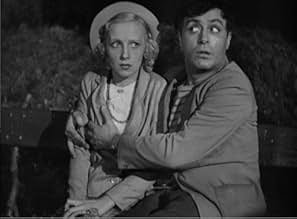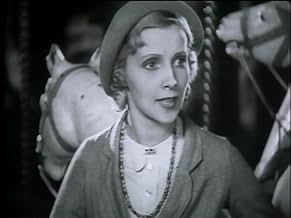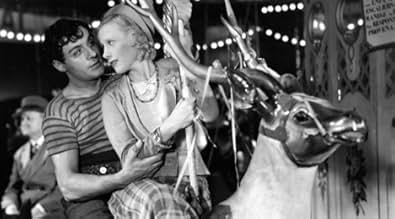Aggiungi una trama nella tua linguaTwo women love the same man in a world of few prospects. In Budapest, Liliom is a "public figure," a rascal who's a carousel barker, loved by the experienced merry-go-round owner and by a yo... Leggi tuttoTwo women love the same man in a world of few prospects. In Budapest, Liliom is a "public figure," a rascal who's a carousel barker, loved by the experienced merry-go-round owner and by a young, innocent maid. The maid, Julie, loses her job after going out with Liliom; he's fired... Leggi tuttoTwo women love the same man in a world of few prospects. In Budapest, Liliom is a "public figure," a rascal who's a carousel barker, loved by the experienced merry-go-round owner and by a young, innocent maid. The maid, Julie, loses her job after going out with Liliom; he's fired by his jealous employer for going out with Julie. The two lovers move in with Julie's aun... Leggi tutto
- Regia
- Sceneggiatura
- Star
- Marie
- (as Mimi Funès)
- Alfred
- (as Alcover)
- La cliente du manège - Hippo Palace Customer
- (non citato nei titoli originali)
Recensioni in evidenza
You can see why the confusion arises. Liliom is very much a product of its time and place. Made in France in the early 30s, it has the same blend of down-to-earth realism and dreamy sentimentality that characterises the early films of Rene Clair or Jean Vigo's L'Atalante. And this is surely why many commentators on Lang, most famous for his paranoiac thrillers, find it so hard to accept as part of the director's canon. But Lang, while he may have inflexible in style, was by no means limited in genre.
What connects all of Lang's pictures is the extravagant oddity with which they are shot. Metropolis is a baroque sci-fi, Scarlet Street is a baroque film noir, and Liliom is a baroque romance. The picture has the same intense and often musical rhythm of Lang's late silent pictures. As usual, he places us somewhat forcefully within the action at key moments, such as the opening scene where the two lovers meet, where the camera accompanies them on the carousel. We are made to feel Julie's strife through numerous point-of-view shots of Charles Boyer, or ones of a plaintive Madeleine Ozeray looking straight into the lens. The heaven and hell sequences are pure Lang fantastical indulgence, a far cry from the minimalist equivalents in the musical adaptation Carousel.
But to the consternation of the auteurists, who would maybe have Lang turn Molnar's classic into a grim fable of doom and destiny, Lang makes it abundantly clear that he can "do" romance, and do it with sincerity. In fact, viewing the director's work as a whole this is not entirely surprising – Spione, You and Me, The Big Heat and many more are incredibly tender at times. Here he gives weight to the relationship between Liliom and Julie from the way he shoots its beginning. We see Charles Boyer doing his exuberant barking act, always in mid-shot, often partly obscured by foreground business. When he lays eyes upon Ozeray, he suddenly comes into close-up. We thus connect with the character at the same time he connects with his beloved-to-be. Their first moments together are shot with typical Lang quirkiness – low angles and rapid edits. However, as the romance blossoms their moments together are allowed to play out in long takes and single camera set-ups.
Which brings me onto my next point. There is one way in which Liliom differs markedly from the average Fritz Lang picture. Normally the actors under Lang's jurisdiction were excessively hammy, all wild gestures and crazy faces, even in the lead roles. In Liliom however the keynote is one of restraint and credibility. We have a young Charles Boyer displaying all the charismatic charm that would propel him to Hollywood stardom a few years later. Sure, he is highly expressive, but in a way that is believable for that character. Madeleine Ozeray makes an incredibly fragile figure, playing out her emotions through tiny, soft movements. It's a pity she didn't share Boyer's later success. There's also a wonderfully mannered performance from Henri Richard as the commissioner. Commanding acting such as that on display here is surely the most important asset any picture can have. Regardless of how it fits into the general scheme of his work, Lang was right about Liliom. It is one of his best.
Lang is very creative in this film, keeping us offbase as to where the film is going and capturing nice shots with reflections and shadows. At one point Boyer is mired in bureaucracy waiting for a form to be stamped, which is a comical moment. I had the film scored a little higher, but it dropped a little for me in just how light it got as it played out. The film was set up for much more interesting moments, and it seemed like a blown opportunity when it got silly. I was also not a fan of one of the film's messages, that out of love in a relationship "someone can beat you, and beat you, without hurting you at all." Watch this one for the unique role Boyer plays (apparently one of the actor's favorites), and to see Fritz Lang's only French film, made shortly after he left Germany.
First, a lap dissolve to indicate, as that technique so often does, the passage of time. It begins with the principals' names carved in wood "Julie Liliom"-- then that dissolves to new names carved over those "Andre et Daniele"-- and that in turn dissolves to "Mado Jean." Lovers fading into the background as time passes. Foreshadowing doesn't get sweeter or sadder than that.
Second, when Liliom is asked his surname, he replies, "Zadowski, like my mother." It is the only indication that he is illegitimate, and that sad fact is all the more poignant for being so understated.
As I watched I kept wondering what latter-day feminists might think of this film, because Liliom slaps Julie often enough to be accused of wife-beating. But of Liliom's character, Julie says, "Bad boy. Brute. Darling." She loves him, and knows he would never really harm her. The final moments of the film deliver its message-- love people for who they are, for better or worse, you won't change their character, and even brutes have hearts and can be worthy of love.
But I save my final remark for Charles Boyer. I've always enjoyed his work, but I was not prepared for a performance of this skill and range. He is alternately charming or savage, cocky or rueful. And he gives a gorgeously physical performance-- in a class with Toshiro Mifune as Sanjuro, or Yul Brynner as the King of Siam. He is always in motion, and when he sits with Julie on a park bench for the first time, seducing her, brushing her breasts with his hands, he seduces the whole audience. Well, me anyway.
Not least among his achievements...Lang pulls off the well-nigh impossible feat of making Charles Boyer interesting! Sorry, but I'd always found this actor deeply resistible. A suburban housewife's stereotype of a suave Continental lover. But in this movie, Boyer plays a role that (even five years later) would have been reserved exclusively for Jean Gabin. A tough carnival barker and petty crook. A sexy 'bad boy' in a striped, clinging T-shirt and skin-tight jeans.
Boyer as Liliom is a Gallic cousin of Stanley Kowalski in A Streetcar Named Desire. I could well understand why Julie (Madeleine Ozeray) fell head over heels for him, because I did too. He treats her appallingly, of course. Boozing, whoring, gambling...even a (very non-PC) touch of wife-beating. For all its fantasy elements, this love story is as warped and sadomasochistic as any in later Lang movies, like Secret Beyond the Door or The Big Heat. (Hot coffee, anyone?)
Eventually, two angels show up and haul Boyer off to the hereafter - where he must atone for his sins! The term 'angels' is one I use loosely. Dark-suited, pale-skinned and shaven-headed, these two guys look like denizens of an X-rated Berlin nightclub. Kinkier still is Boyer's personal 'spirit guide' - a mad-eyed knife-grinder played by Antonin Artaud, the twisted genius who invented the Theatre of Cruelty.
Liliom is a rare treat for old-movie buffs. Lyrical and fantastic, yes. Soppy and sentimental, never. It stands comparison with Lang's best work from Berlin or Hollywood. I can only regret he did not spend more time in France.
Lo sapevi?
- QuizFritz Lang considered this his best film.
- Citazioni
First Angel: It would be too convenient if death were the end of everything.
- Curiosità sui creditiMadeleine Ozeray, who plays Julie, also plays her daughter, but this has never been mentioned in any credit list for the film.
- Versioni alternativeThe original video release of this (on Sinister Video) in 1998 did not have subtitles, and was cut by half-an-hour. The current DVD and VHS release on Kino has subtitles and is the full-length version of the film.
- ConnessioniFeatured in Rodgers & Hammerstein: The Sound of Movies (1996)
I più visti
- How long is Liliom?Powered by Alexa
Dettagli
- Tempo di esecuzione1 ora 58 minuti
- Colore
- Mix di suoni
- Proporzioni
- 1.37 : 1
Contribuisci a questa pagina































